Posts by Christopher Lochhead
137 New Category of Humans: Native Digitals Are Transforming The World & No One’s Paying Attention!
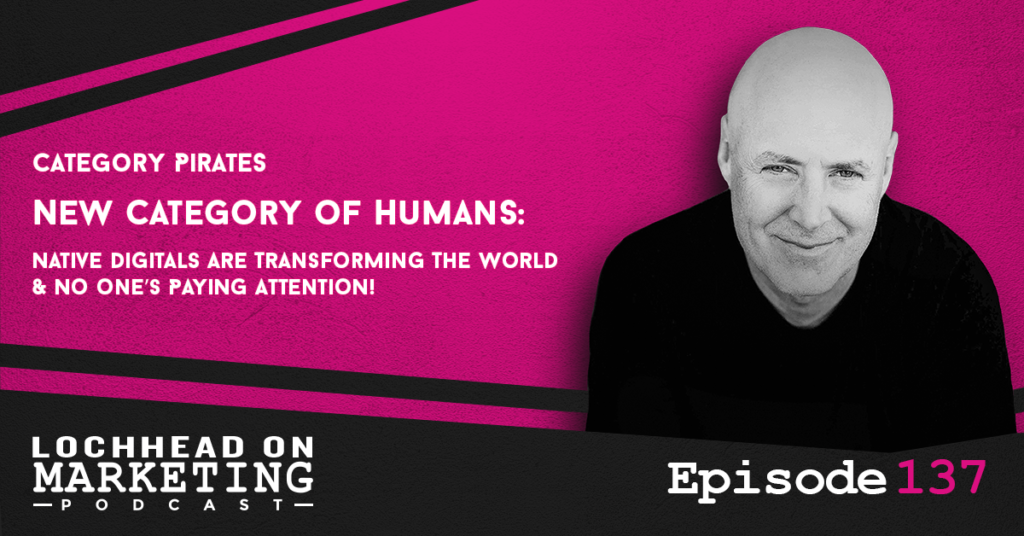
Podcast (lochheadonmarketing): Play in new window | Download (Duration: 44:34 — 30.6MB) | Embed
Subscribe: Apple Podcasts | Spotify | RSS | More
Originally published in ?☠️ Category Pirates: It’s not a weekly newsletter. It’s a weekly mini-book.
Lately, there has been a fundamental, dare I say, seminal change in the category design of human beings. That is to say, the definition of what a human is has changed. You see, if you’re 35 and up, you are the last of a dying breed called Native Analogs. If you’re 35 or younger, you are the first generation of Native Digitals.
Native Digital’s experience life in a digital first way, and an analog way, second. Native Digitals have come of age integrated with the machines. Your smartphone and technology overall are like part of who you are as a person.
Most Native Analogs do not get this. Most people are not ready for the fact that everything is moving from an analog paradigm to a native digital world.
Wait, haven’t we had this dialogue before? Yes, we did in FYD episode 250. But this change is so radical, that it bears repeating, so we are doing it here as well. So in this two-part series of Lochhead on Marketing, we explore Native Digitals versus Native Analogs, and how it is important to realize that we are shifting to a digital paradigm faster than you think.
Category Neglect
First off, we start as to why it is important to recognize category shifts like the one we are experiencing now. Most category kings and queens tend to fall into a trap, in which they ignore new categories that may be adjacent or indirectly related to theirs.
When a new category arises (seemingly out of nowhere), the incumbent doesn’t topple over because they were unaware of the new category queen. More often than not, they fall because they dismissed what was happening right before their very eyes.
It’s not ignorance. It is arrogance coupled with the gravitational pull of “the way it is.” Because the people profiting in the present want things to stay the same.
This is called Category Neglect. Category Neglect doesn’t come from people being stupid or lacking sufficient data and resources to spot the headwinds and tailwinds of the future. It comes from a refusal to acknowledge which direction the wind is really blowing.
Why do they fall to such a seemingly obvious trap? This happens because the gravitational pull is too strong. A company gets used to earning hundreds of millions, or billions of dollars per year, and thinks it can do no wrong.
The company becomes deeply invested in the present. Anything that threatens the way it is now is dismissed.
Native Analogs vs Native Digitals
One of the most profound shifts happening in the world today is rooted in the ever-escalating debate between generations young and old. It is a shift hiding in plain sight. Just like the Tymshare executives staring out the window at Apple’s cranes building the headquarters of the company that would ultimately put them out of business, most people over 35 years old can’t see this shift happening.
Instead, they say to themselves, “Eh, we’ve got nothing to worry about.”
As Category Pirates, we feel it is our obligation to sound the alarm when we see rocky shores ahead. Some of us are facing a once-in-a-generation set of headwinds that could not just stymie growth, but sink our entire ship. If those of us over age 35 aren’t careful, this divide could result in one of the greatest instances of Category Neglect.
However, those who see this mega shift and act on it, on the other hand, will sail into the sunset a lot of happy pirates, make more money, and make a way bigger difference in the world.
With that said, let’s first give a better definition of what a Native Analog and Native Digital are. We’ll also define where their biggest difference lies.
There are two types of people on planet earth today.
- The first are Native Analogs. These are Baby Boomers and Gen Xers, born anywhere from the 1940s all the way up to the early ‘80s. Today, they range between the ages of 40 to 75, and make up approximately 136.8 million Americans.
- The second are Native Digitals. These are Millennials and Gen Zers, born between the early 1980s to as recently as the 2010s. These demographics are around 35 years of age on the high end, down to as young as 6 years old. They make up approximately 140.1 million Americans.
The difference?
Native analogs grew up in a time where technology was an addition or a distraction from their real lives.
Native digitals grew up in a time where their “real” lives were a distraction from their digital lives.
This is a profound shift—and no one seems to be talking about it. Even more stunning, some of the largest native digital brands on the planet are run by Native Analogs. Who don’t get it either.
To learn why it is important to know more about Native Digitals and how it can affect your category and businesses, download and listen to this episode. You can also check it out at Category Pirates.
Bio
Christopher Lochhead is a #1 Apple podcaster and #1 Amazon bestselling co-author of books: Niche Down and Play Bigger.
He has been an advisor to over 50 venture-backed startups; a former three-time Silicon Valley public company CMO and an entrepreneur.
Furthermore, he has been called “one of the best minds in marketing” by The Marketing Journal, a “Human Exclamation Point” by Fast Company, a “quasar” by NBA legend Bill Walton and “off-putting to some” by The Economist.
In addition, he served as a chief marketing officer of software juggernaut Mercury Interactive. Hewlett-Packard acquired the company in 2006, for $4.5 billion.
He also co-founded the marketing consulting firm LOCHHEAD; the founding CMO of Internet consulting firm Scient, and served as head of marketing at the CRM software firm Vantive.
We hope you enjoyed this episode of Lochhead on Marketing™! Christopher loves hearing from his listeners. Feel free to email him, connect on Facebook, Twitter, Instagram, and subscribe on iTunes!
257 How Entrepreneurs Change Lives & Communities with “IRON” Mike Steadman; Marine Officer, Boxing Champion & Veteran Entrepreneur Advocate
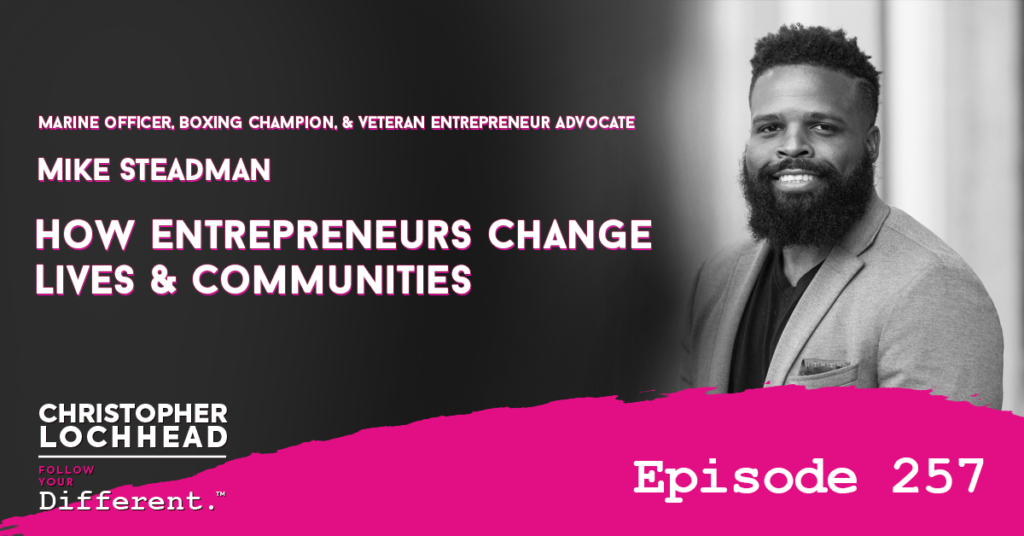
Podcast: Play in new window | Download (Duration: 1:54:18 — 78.5MB) | Embed
Subscribe: Apple Podcasts | Spotify | Pandora | RSS | More
For some, entrepreneurship is a way up in the world. For others, it’s a way out of their current situation. But no matter what the motivation, entrepreneurship is ultimately an opportunity to create a different future. Not only for the entrepreneur themselves, but for their customers, employees, and ultimately an entire community. This is the reason why me and our guest, “IRON” Mike Steadman, love entrepreneurship.
“IRON” Mike Steadman is a retired combat Marine officer. He is also a three-time National Collegiate boxing champion in the military. He’s the founder of Iron Bound Boxing and Education, which is a non-profit in New Jersey. He also founded a company called Dog Whistle Branding, a marketing agency that helps veteran-owned businesses with podcasting, brand, and category design.
In this episode of Christopher Lochhead: Follow Your Different, we have a dialogue with “IRON” Mike Steadman as we talk about all things entrepreneurship, including topics such as helping veteran entrepreneurs. This is a conversation you’re going to find incredibly inspiring and empowering, so stay tuned.
“IRON” Mike Steadman on Losing the Ability to Communicate
The conversation starts as Mike responds to a comment about sounding like a podcaster. He shares that being a podcaster helped him become better at public speaking. Now, when he does interviews, people are surprised on how Mike can do it all in one take.
Nowadays, being able to communicate with each other in a clear and articulate way seems like an outlier than the norm. Mike thinks that this is due to the internet and the anonymity it provides, that we lost something essential when talking to other people.
“I think we’re struggling with it. It’s because we’ve lost the ability to communicate with empathy. That’s the thing, right? You can communicate, share your opinion, or something. But you can also be an asshole about it. And I don’t think we are very empathetic anymore.” – Mike Steadman
“IRON” Mike Steadman on being the Loudest in a Conversation
One of the problems we have with communicating nowadays is that there seems to be a lot of yelling going on. Some do it mostly for attention, others to push their ideas further than the others.
For Mike, it’s a matter of respecting the people you are conversing with.
“If you’re the loudest person in the room, you’re also the weakest person in the room. And sometimes I think yelling is, I don’t want to call it a cop out, right? But yelling is we just write (comments), we don’t know how to communicate. We don’t know how to respect people’s opinion.” – Mike Steadman
“IRON” Mike Steadman on Social Media
It is ironic that “social media” has made a lot of people antisocial. Mike thinks it is because people find it easier to just hide behind a computer screen and interact with people that way.
Unfortunately, some people who start a business has the same mindset. But for Mike, it’s just not the best way to do things. Regardless of whether you’re doing things digitally or analog, you still need to communicate with people properly and build proper relationships with them.
“I’ve been saying (that) business is a contact sport. Unfortunately, I think a lot of the generation now when they start a business, they think they can just go on social media. But human to human, you still have to look someone in the eye (and) talk to him convey your value. And I think the default (now) is social media. Even dating girls, the default is an app. So I think we have lost the ability to communicate, actually.” – Mike Steadman
To hear more from “IRON” Mike Steadman and how Social Media is both the cause and the cure for proper communication, as well as how he helps veteran entrepreneurs connect with the current market, download and listen to this episode.
Bio
“IRON” Mike Steadman is a serial entrepreneur based in Newark, NJ, who’s committed to improving the economic and social outcomes of urban youth and military veterans through boxing, entrepreneurship, and new media.
He’s the Founder and CEO of IRONBOUND Boxing, a nonprofit that provides free amateur boxing training, entrepreneur education, and employment opportunities for Newark youth & young adults.
Mike and his partner Keith Colon, oversee the legendary IRONBOUND Boxing Academy, their free boxing gym for youth in Newark, NJ. He also runs IRONBOUND Media, a podcast production company that produces branded podcasts for veteran-owned businesses.
Mike is a three-time National Collegiate Boxing Champion from the United States
Naval Academy and Marine Corps Infantry Officer, with deployments to Afghanistan and Japan/Philippines. He’s currently a Hoover Veteran Fellow at Stanford University’s Hoover Institution, a public policy think tank promoting the principles of individual, economic, and political freedom.
His goal is to raise 1.5 million dollars to build the ever IRONBOUND Courage Academy, a 5,000 sqft boxing facility and small business incubator space for Newark’s youth and young adults.
Through his efforts growing IRONBOUND Boxing and IRONBOUND Media, Mike has established himself as a high-profile veteran advocate and the new face of social entrepreneurship.
To learn more visit www.IRONBOUNDBoxing.org and www.IRONBOUNDMedia.com.
To learn about IRONBOUND Boxing and our efforts in Newark, please visit www.Ironboundboxing.org
Mike is also a Hoover Institute Veteran Fellow.
Links
Follow “IRON” Mike Steadman!
Website: IronboundBoxing.org | IronboundMedia.com | DogWhistleBranding.com
Linkedin: in/Iron-Mike-Steadman
Instagram: @IronMikeSteadman
We hope you enjoyed this episode of Follow Your Different™! Christopher loves hearing from his listeners. Feel free to email him, connect on Facebook, Twitter, Instagram, and subscribe on iTunes!
256 Mission Driven: Saving Lives in Afghanistan with Valerie Edmondson Bolaños

Podcast: Play in new window | Download (Duration: 1:02:55 — 43.2MB) | Embed
Subscribe: Apple Podcasts | Spotify | Pandora | RSS | More
In this episode of Christopher Lochhead: Follow Your Different, you will hear one of the most inspiring, horrifying, and yet deeply moving conversations from our guest, Valerie Edmondson Bolaños.
Valerie Edmondson Bolaños is the founder of an extraordinary NGO called Warrior Angels Rescue. She started her own NGO in the way of Hurricane Maria. It was a Category Five storm that devastated her home island of Puerto Rico back in 2017. What started off as an effort to rescue her own family grew into a much larger scale over time.
Since August of 2021, Valerie and the Warrior Angels Rescue has been evacuating girls, women, and their families from the humanitarian crisis that is escalating in Afghanistan after the United States left. What you’re about to hear is really one of the most inspiring mission-driven founders you can listen to. We hope that it moves you as well.
Valerie Edmondson Bolaños on the Afghanistan Situation
The conversation starts as Valerie gives a perspective of what the situation is in Afghanistan at this moment after the United States withdrawal last August of 2021.
“It’s pretty horrific, which should come as no surprise. We’ve noticed (that) just in the three months that we’ve been working there. It just descended from an absolutely apocalyptic situation into the depths of hell. The messages and videos that we’re receiving directly from the families that we’re helping that are in our evacuation lists are just horrifying. I’ve had nightmares, and I’m not even living through it firsthand.” – Valerie Edmondson Bolaños
These horrors stem from the local terrorist organizations who are trying to root out those who have worked with the US forces when they were still on the ground. They torture and beat them publicly, while abducting and interrogating those who they think had close ties or worked directly with the US forces.
This was on top of the different terrorist organizations jockeying for power amongst themselves, which adds another layer of suffering for those on the ground.
The Taliban Taking Away the Power
Valerie shares that are a lot of shortages on the ground. The economy has all but shut down entirely because people are in hiding. People who had decent homes and careers had to leave almost everything to stay with families that are less conspicuous.
“The Taliban is literally trying to take away power from the people who have even the slightest bit of power. And so much power comes from being educated and being having a profession. So they want to quash any potential viable resistance to their takeover by not only literally taking away power and electricity and connectivity from everyone, but they’re targeting middle class families and upper class families. So everyone’s gone into hiding, which means that most of the mechanisms that keep society going and keep the economy going are completely shut down.” – Valerie Edmondson Bolaños
While the medical care is not completely gone, it’s can still be hard to get in the current circumstances. There are simply too much people that are now relying on volunteer medical professionals who are scared but also want to save as many lives as they can.
How the Pandemic Factors In
On the topic of medical care, Valerie was asked about the COVID spread and deaths in Afghanistan. She shares that there isn’t really any visible evidence of any data being collected at this point. Not to mention any effort for vaccination programs to speak of.
“There’s no data being collected. People aren’t going to hospitals for the most part, because then they’re afraid they’ll be killed. So yeah, I don’t I don’t think any data is really coming out, or being collected. I mean, that would require a functioning government, which is not what the Taliban has created.” – Valerie Edmondson Bolaños
The pandemic really added a few levels of complication of how volunteer NGOs like the Warrior Angels Rescue can operate on the ground, as not only are you worried about getting shot, the idea of a virus ravaging the neighborhood just scares both the locals and volunteers alike. The Taliban are definitely not doing anything to alleviate it. For them, it’s just another way of keeping people in check and not banding together to take back the country.
To hear more from Valerie Edmondson Bolaños and how she and the Warrior Angels Rescue help those in dire need, download and listen to this episode. If you wish to help them in their efforts, check out the links at the end of this article.
Bio
Valerie Edmondson Bolaños
Valerie Edmondson Bolaños founded Warrior Angels Rescue in the wake of Hurricane Maria, a category 5 storm that devastated her home island of Puerto Rico in 2017.
What started out as an effort to rescue her own family quickly grew into a large-scale effort to evacuate hundreds of medical patients, pregnant mamas, and elderly people who could not survive days (let alone months) without electricity. Since then, our 100% volunteer team has responded to 5 disasters: a mudslide, an earthquake swarm, a tornado, a global pandemic, and the international border shutdowns due to COVID.
Since August of 2021, Warrior Angels Rescue has been evacuating girls, women, and their families from the humanitarian crisis unfolding in Afghanistan.
Warrior Angels Rescue has saved hundreds of lives by securing safe harbor in Ecuador and routing our evacuees through Pakistan to Canada and other countries willing to step up and help.
With a resettlement strategy founded on the principles of empowerment and synergy, Warrior Angels Rescue has developed a win/win/win solution that protects the freedom of our refugee families, benefits the local communities from our host countries, and costs the American taxpayer $0.
Links
Follow Valerie today!
Website: WarriorAngelsRescue.org | News Page: WarriorAngelsRescue.org/news
GoFundMe: Evacuate School Girls to Safety
LinkedIn: in/Valerie-Edmondson-Bolanos
More on Valerie Edmondson Bolaños and the Warrior Angels Rescue
We hope you enjoyed this episode of Follow Your Different™! Christopher loves hearing from his listeners. Feel free to email him, connect on Facebook, Twitter, Instagram, and subscribe on iTunes!
136 Rivian IPO Through The Category Lens
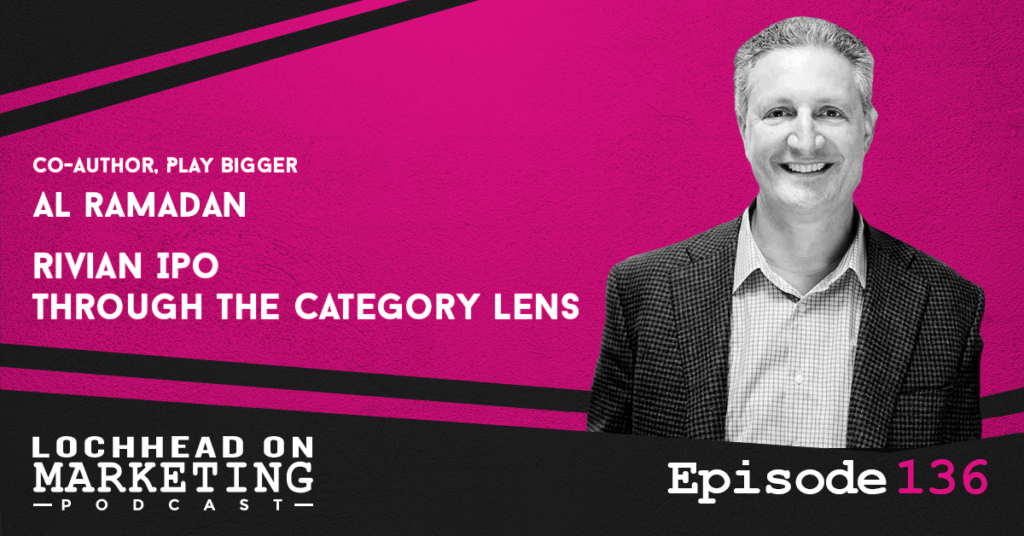
Podcast (lochheadonmarketing): Play in new window | Download (Duration: 1:06:38 — 45.8MB) | Embed
Subscribe: Apple Podcasts | Spotify | RSS | More
In Lochhead on Marketing episode 127, we talked with Al Ramadan, Co-founder of Play Bigger Advisors and co-author of Play Bigger, the book. On that episode, we unpacked the upcoming Rivian IPO.
Now that Rivian has gone public, we thought it would be cool to get together again, and unpack what happened through a category design lens. Specifically, how Rivian was able to use their IPO not just as a financing event, but a category-defining event.
Welcome to Lochhead on Marketing. The number one charting marketing podcast for marketers, category designers, and entrepreneurs with a different mind.
The Rivian IPO: An Update after the Launch
Al Ramadan recaps what Rivian IPO was during the public offering, which had a market cap of $60 billion at the time. This was already a very impressive number, considering that it was still an IPO.
What people didn’t anticipate is that after Rivian’s launch, they blew well past that and now sits over $100 billion in valuation. As a result, they are now the third largest automotive company behind Tesla and Toyota.
All in all, it is an incredible IPO, and one to observe in the future as it develops.
Betting on Potential vs Performance
Despite all that, there are those who are still skeptic of what had happen, and consider it as a fluke or a big risk. But it all boils down to betting on the potential of an idea, rather than just prior performance. Right now, some investors are seeing things in a new light.
“I think it’s hard for investors to understand because that’s been just been the way they are. They look at multiples of revenue or multiples of trucks shipped, or all of those other vital metrics within an organization. But the new investors I think, are starting to look past that.” – Al Ramadan
Paving the Way into a New Category
What Al finds interesting is that currently, 70% or more of the market cap for the electronic car category is cornered by Tesla. Yet Rivian might have to potential to great its own category within it, and be the category king for it.
Because Rivian is not just planning on the electronic cars and trucks. They are also including everything else that comes along with it. We’re talking charging networks and stations, dealerships, and the like. It’s taking into consideration the whole ecosystem, as supposed to just that one product.
“So if you go into this with the mindset of like, I’m going to value this as an automotive industry as it was over the last 125 years, you’re gonna miss big time.” – Al Ramadan
To hear more from Christopher and Al and their thoughts and updates on the Rivian IPO, download and listen to this episode.
Bio
Al Ramadan is a co-founding partner of Play Bigger Advisors and coauthor of the book, Play Bigger. He also co-founded Quokka Sports, which revolutionized the way people experience sport online.
Al then joined Macromedia and Adobe, where he spent almost ten years changing the way people think about great digital experiences. At Adobe, Al led teams that created the Rich Internet Applications category and helped develop the discipline of experience design.
In the early ‘90s he applied data science to Australia’s Americas Cup — an innovation in sports performance analytics. His work in sailing led directly to the idea for Quokka. He lives in Santa Cruz, California.
We hope you enjoyed this episode of Lochhead on Marketing™! Christopher loves hearing from his listeners. Feel free to email him, connect on Facebook, Twitter, Instagram, and subscribe on Apple Podcast! You may also subscribe to his newsletter, The Difference, for some amazing content.
255 Security, Ransomware, Geo-Political Threats, New Domains of Warfare & “Game of Crimes” with Morgan Wright

Podcast: Play in new window | Download (Duration: 1:34:46 — 65.1MB) | Embed
Subscribe: Apple Podcasts | Spotify | Pandora | RSS | More
Today on Christopher Lochhead: Follow Your Different, Morgan Wright is back to talk about all things Security: new geopolitical threats, the new domains of warfare, and how they look at evil crimes through the eyes of the legendary public servants who solve them. This is a very fun, insight-packed real conversation with one of America’s highest profile crime fighting voices.
Morgan Wright is an internationally recognized expert on cybersecurity and terrorism, identity theft, and privacy. He was also a senior adviser to the US State Department, anti-terrorism program, and a senior law enforcement adviser for the 2012 Republican National Convention. Morgan has developed solutions in defense, justice and intelligence for the largest technology companies in the world. He is now also the co-host of a red-hot new podcast called Game of Crimes. This new podcast shines a light to the men and women who serve and protect.
So if you are looking for an in-depth update on how our cybersecurity stands today, stay tuned to this episode.
Game of Crimes with Morgan Wright
We open up on the topic of Morgan’s new podcast. Game of Crimes is a podcast that he co-hosts with Steve Murphy, and it is a long-form true crime podcast.
Morgan shares that they were inspired with Follow Your Different, where they go deep into the topic and explore multiple topics related to the guests. They enjoyed the format so much that most episodes end up as two-parters, because they find a lot to explore on each guest and topic.
“Our interviews are long. When I mean (long), we’re they’re always a two–parter. So that’s actually been a fun part because it kind of gets you back into it.” – Morgan Wright
There’s a risk to doing two-parters, but the payoff is if you get people hooked, they’d have to hear both episodes to get more of their fix.
Morgan Wright on Looking at the Problem Wrong
Morgan then talks about the Cybersecurity conferences that he has attended over the years. His shares that his recent favorite opener is what Elon Musk did different to become a rich guy in the world. That is, he thought differently, and revolutionized the space industry through SpaceX.
He then explains that sometimes the problem is not the biggest problem, but the way we think about the problem.
“What I say is the problem isn’t the problem. The problem is the way we think about the problem. That’s not what counts. What really counts is the way our adversaries think about the problem. And they beat us every time because they out-think us about what to do.” – Morgan Wright
Another example he has is about bank robberies. It makes sense that if you want to beef up your security, you need to learn how the people on the other side thinks. Instead, managers and bank owners just get into their conference rooms and say what they think works, which often turns into an echo chamber of sorts.
Prevention is ALWAYS Better than a Cure
In line with this train of thought, Morgan Wright mentions that cybersecurity experts need to start looking at the problem from a different perspective. Because up until recently, the implications on cybersecurity have always been Response and Recovery. While that it all well and good, the problem with that is your systems are reactionary.
Morgan thinks that cybersecurity should be proactive, where you stop and prevent cyber attacks from happening in the first place.
“The reason we keep getting the results we have is because of the words you keep using you keep talking about Response and Recovery. That means it’s already happened to you. What you’re saying is that we should continue to buy effective fire alarms that say congrats, your house is successfully burned down. So let’s start talking about stopping and preventing. And the minute we start doing that, we will start changing what we think about the problem.” – Morgan Wright
To hear more from Morgan Wright and the current state of Cybersecurity and how the fight against cyberterrorism is done, download and listen to this episode.
Bio
Morgan Wright is an internationally recognized expert on cybersecurity strategy, cyberterrorism, identity theft and privacy.
He is President and Chief Development Officer for RadiusAI.
He currently serves as a Senior Fellow at The Center for Digital Government, and is a national security opinion contributor to TheHill.com.
Morgan’s landmark testimony before Congress on Healthcare.gov changed how the government collected personally identifiable information.
He’s made hundreds of appearances on national news, radio, print and web including CNBC, Fox News, Fox Business, CNN, ABC, NPR, NBC and more. Previously Morgan was a Senior Advisor in the US State Department Antiterrorism Assistance Program and Senior Law Enforcement Advisor for the 2012 Republican National Convention. In addition to 18 years in state and local law enforcement as a highly decorated state trooper and detective, Morgan has developed solutions in defense, justice and intelligence for the largest technology companies in the world including SAIC, Unisys, Alcatel-Lucent and Cisco.
He’s a contributing author for the 4th Edition Computer Security Handbook, and has been quoted in 2 New York Times best sellers (Sharyl Attkisson: Stonewalled and Carmine Gallow: Talk Like TED).
Links
We hope you enjoyed this episode of Follow Your Different™! Christopher loves hearing from his listeners. Feel free to email him, connect on Facebook, Twitter, Instagram and subscribe on iTunes!
135 Sales Kick Off: The 2 Questions You Must Answer for Your 2022 Kick Off Event
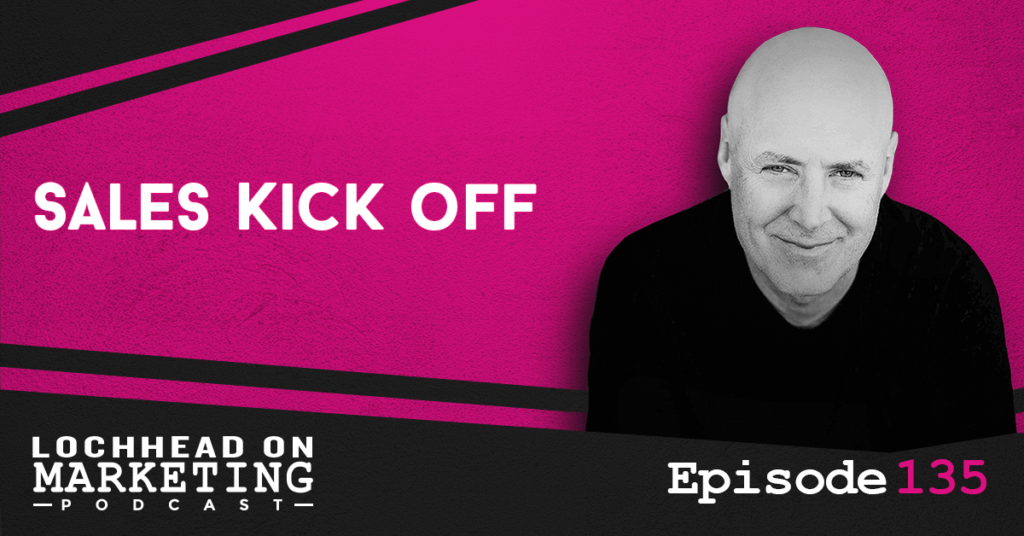
Podcast (lochheadonmarketing): Play in new window | Download (Duration: 8:50 — 6.1MB) | Embed
Subscribe: Apple Podcasts | Spotify | RSS | More
In this episode, let’s talk about Sales Kick Off. Since it’s that time of the year where most sales, marketing, and executive teams are working on sales kickoff events for the new year and/or a company kickoff event.
While most people work on the practical and tactical aspect of things, there’s a strategic question that we need to address. If we get the answer right, it can lead to a very successful sales kickoff and a successful year.
Welcome to Lochhead on Marketing. The number one charting marketing podcast for marketers, category designers, and entrepreneurs with a different mind.
Sales Kick Off Events
Like most companies, you are also probably working on this as early as the 4th quarter of the year. If you’re in a well-established company, you probably have all the basics down, in terms of systems, workflows, and all related processes.
While those parts are also important, the focus in these kinds of kickoffs is the context that it operates in. Why are you doing this sales kickoff? Is it for something new, or maybe an important change in your company that will affect how you interact with your clients and customers?
Why Should I Stay?
That said, we have a very unique context going into 2022. You have probably heard about the “Great Resignation”. People have been quitting their jobs to find better work or pursue other careers. Those who stayed are probably getting recruitment emails from competition due to this sudden lack of high-value individuals in certain industries.
So heading into 2022, the context of your sales kickoff needs to answer the question, “Why should I stay?”
In order to answer that question, you should look on what truly motivates people. The first point is, people who are invested in the company are motivated by a mission. They want to feel like they’re a part of something greater than themselves. That what they do for the company makes a difference.
The second point is that they want to feel connected to their colleagues. Granted, this is harder nowadays due to COVID and social distancing. So instead of being physically around people, find a way to align people’s goals, so that they get to interact with each other while having the same mission. This ties to the first point as well.
If your company is still on a full remote capacity right now, you can also be creative with technology. Instead of socializing in the pantry like before, set up zoom meetings for your team where you can just talk about the recent activities you have done outside of work. Or maybe share what you have been doing lately, so that other people in the team are aware of your contributions and could help with your struggles.
In the situation where we’re primarily using a digital first native digital way to do that, think about using the technology and creative ways to bond people to each other into the mission and point of view.
Bio
Christopher Lochhead is a #1 Apple podcaster and #1 Amazon bestselling co-author of books: Niche Down and Play Bigger.
He has been an advisor to over 50 venture-backed startups; a former three-time Silicon Valley public company CMO and an entrepreneur.
Furthermore, he has been called “one of the best minds in marketing” by The Marketing Journal, a “Human Exclamation Point” by Fast Company, a “quasar” by NBA legend Bill Walton and “off-putting to some” by The Economist.
In addition, he served as a chief marketing officer of software juggernaut Mercury Interactive. Hewlett-Packard acquired the company in 2006, for $4.5 billion.
He also co-founded the marketing consulting firm LOCHHEAD; the founding CMO of Internet consulting firm Scient, and served as head of marketing at the CRM software firm Vantive.
We hope you enjoyed this episode of Lochhead on Marketing™! Christopher loves hearing from his listeners. Feel free to email him, connect on Facebook, Twitter, Instagram, and subscribe on Apple Podcast! You may also subscribe to his newsletter, The Difference, for some amazing content.
254 How To Create Different Futures with Kevin Maney, Co-Author of Play Bigger & Co-Founder of Category Design Advisors
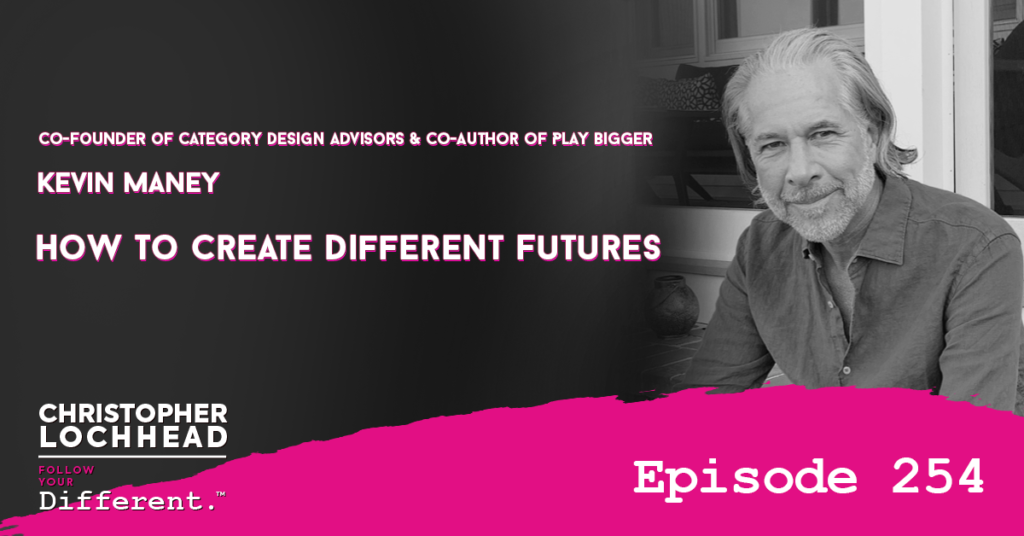
Podcast: Play in new window | Download (Duration: 1:13:19 — 50.3MB) | Embed
Subscribe: Apple Podcasts | Spotify | Pandora | RSS | More
As we all know, Context is everything. Around here, we believe that thinking about thinking is the most important kind of thinking. So if you want to design a different future, the context of your thinking matters. In this episode of Christopher Lochhead: Follow Your Different, we discuss context and much more with Kevin Maney.
Kevin Maney is the co-founder of Category Design Advisors, where he and his partners advise CEOs on how to design and dominate market categories. He is also one of the godfathers of Category Design, and one of the co-authors of Play Bigger, alongside Al Ramadan and myself.
We talk about a lot of topics that will help frame your think, and why the barriers to entry for Category Design keep dropping. We also discuss why Category Design is more important now than it was in 2006. To know why that’s the case, stay tuned to this episode.
Kevin Maney On Playing Bigger
It has been five years since Play Bigger came out, and there have been a lot of changes in Category Design over the years. Kevin suggests that they should get together again and pool together what they have learned over the years.
That said, Kevin has noticed a few things that were big drivers of why category creation and design is so important. Some of them they have touched on in Play Bigger, but did not have the bandwidth to delve deeper into. These drivers are what Kevin and the others have been explaining to CEOs over the past years, so they can be aware of how important it is in dominating the market.
Though the most obvious catalyst in the recent years has been COVID. COVID has accelerated the amount of category breakthroughs, mostly brought about by necessity.
“One of the things that always happens in these times of crisis or radical change like wars, a pandemic, or other things that truly shake up the world (is that) everybody starts doing things in different ways, or looking for new solutions. And it really opens up the possibility of creating new things and new categories that didn’t exist before, solving old problems in new ways or, or addressing problems that have never existed before that arise because of what’s going on.” – Kevin Maney
Kevin Maney on the End of Friction
In any business or market, there will always be friction present. One of the friction Kevin talks about is the friction of geography, and how that can affect the market. Because of such frictions, most people are limited to choose what is available, instead of the category leader for that market.
Fast forward to today, and those frictions are slowly being removed. Now that people have access to a wider variety of the market, they will tend to gravitate towards the category leaders of said category. Which makes aiming to be a category leader is a must now, lest you get left behind.
“The more that the friction of geography disappears, the more we can all choose the global, or at least national category leader of any particular category. So that makes it all the more important in whatever business you’re in to try to be that category leader, or you’re really just going to get sucked down the drain.” – Kevin Maney
The Prevalence of Disintermediation Today
The conversation then shifts to how different things are done today compared to just a few years back. In a way, there’s more disintermediation nowadays compared to the .com era. One of the way it’s very visible now is how we consume entertainment. With the advent of different social media platforms, normal people can interact directly with their idols, rather than having to go to concerts or shows.
On the entertainers themselves, the old formula is getting discovered and debuting on TV or film. Nowadays, people could go viral on their own efforts, or at least without the backing of a major corporation and such.
All this because we have reduced the friction required to make things possible. In the early 2000s, you’d need a lot of equipment, money, and know-how to shoot a simple video, let alone have it viewed by people. Now, all that can be done with just your smartphone.
“That’s an insane decrease in friction, and allows for the creation of these new categories. It allows for a niche player to find their audience everywhere in the world, and not just in some little location or some little pocket.” – Kevin Maney
To hear more from Kevin Maney and how you can create different futures for your business, download and listen to this episode.
Bio
Kevin Maney is cofounder of Category Design Advisors, where he works with CEOs and executive teams to develop and execute strategies to design and dominate markets. He is also a multi-time bestselling author and journalist who writes about technology and society.
His most recent book, UnHealthare: A Manifesto for Health Assurance, was co-authored with venture capitalist Hemant Taneja and Jefferson Health CEO Steve Klasko. It came out in 2020, and tees up how healthcare will evolve in the post-Covid era.
His previous book, Unscaled: How AI and a New Generation of Upstarts are Creating the Economy of the Future, was co-authored with Hemant Taneja and came out in 2018.
His book Play Bigger: How Pirates, Dreamers and Innovators Create and Dominate Markets (Harper Business, 2016), is a collaboration with Silicon Valley veterans Al Ramadan, Dave Peterson and Christopher Lochhead. The book introduces business to the idea of category design and gave birth to the advisory firm Category Design Advisors, where I’m now a partner.
He co-authored, with TIBCO CEO Vivek Ranadive, The Two-Second Advantage: How We Succeed by Anticipating the Future…Just Enough. Merging brain science and computer science, it was a 2011 New York Times bestseller, and predicted much of the conversation we’re now having about artificial intelligence.
He also co-wrote Making the World Work Better, which marked IBM’s centennial in 2001. More than 600,000 copies are in print in a dozen languages.
His other books include Trade-Off: Why Some Things Catch On, and Others Don’t, The Maverick and His Machine: Thomas Watson Sr. and the Making of IBM and Megamedia Shakeout.
Over the years, he’s been a contributor to Fortune, The Atlantic, Fast Company and ABC News, among other media outlets. He was a contributing editor at Conde Nast Portfolio during its brief run from 2007 to 2009. For 22 years, he was a columnist, editor and reporter at USA Today.
He’s appeared frequently on television and radio, including CNN, CBS Sunday Morning and NPR, and lectured at conferences and universities, including New York University, UNC in Chapel Hill, and his alma mater, Rutgers.
Kevin also plays music with other New York rockers in a band called Total Blam Blam.
Links
Follow Kevin Maney today!
Website: KevinManey.com | CategoryDesignAdvisors.com
LinkedIn: in/KevinManey | company/CategoryDesign
Facebook: fb.com/CategoryDesign
Twitter: @KManey | @CD_Advisors
Instagram: @CategoryDesign
We hope you enjoyed this episode of Follow Your Different™! Christopher loves hearing from his listeners. Feel free to email him, connect on Facebook, Twitter, Instagram, and subscribe on iTunes!
134 The Problem With Most Marketing Plans
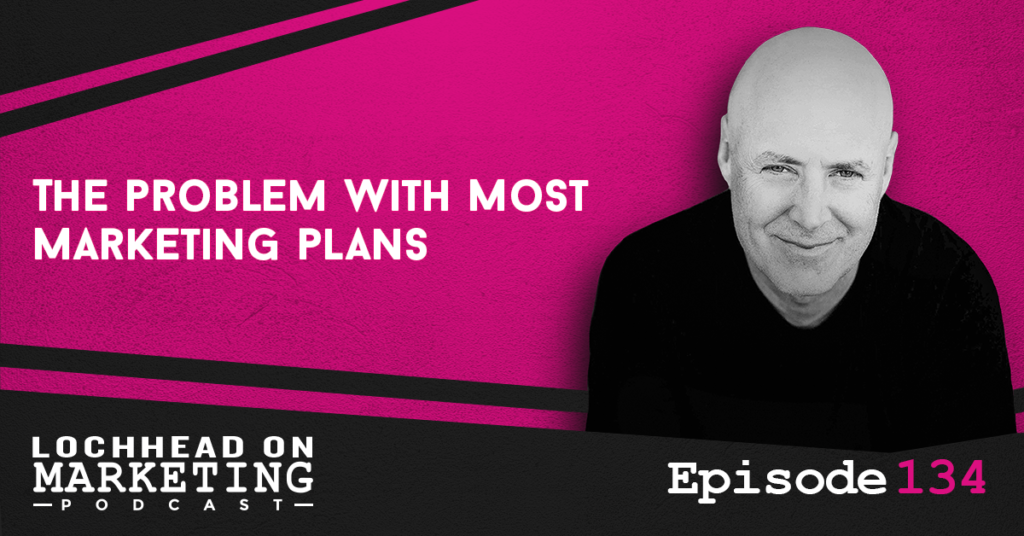
Podcast (lochheadonmarketing): Play in new window | Download (Duration: 11:17 — 7.8MB) | Embed
Subscribe: Apple Podcasts | Spotify | RSS | More
In this episode, let’s talk about the problem with most marketing plans, and what you can do about it.
Welcome to Lochhead on Marketing. The number one charting marketing podcast for marketers, category designers, and entrepreneurs with a different mind.
Planning Based on the Past
Let’s talk about the problem with most marketing plans: mainly, most of them start with last year’s template.
The big problem with most marketing plans is they take last year’s marketing plan and they extend it forward. In category design, one of our favorite expressions is to reject the premise. In the end, we challenge ourselves to push and poke and stretch our thinking. Also, just because it worked in 2020 or 2021, it is not evidence that it will work in 2022.
More importantly, when you start your planning by rejecting the premise, you create a blank sheet of paper.
Crowding Out Innovation
It is also difficult to create a different future when the past is your lens. So if a prior marketing plan is the start point for a plan for the future, by definition you’re taking the past and figuring out how to re-implement it going forward.
That might be feasible for maintaining certain market margins and the like, but it risks crowding out innovation in your marketing plan.
We’re also not telling you to reject the past and just YOLO your future. Going forward, you should have a dialogue on what worked and not worked based on the data from the past, find a way to highlight those points, but at the same time look for things that have not been explored in the market. That way, you can produce a breakthrough in a new field or even create a new category out if it, without having to go for broke.
Three Pillars of a Great Marketing Plan
Once you have rejected the premise and open yourself up to thoughtful data-centric analysis of what works and doesn’t, it’s time to think about going forward. How do you design a marketing plan that creates the future of your choosing?
To do so, try to anchor it around these three pillars.
- Information Wars: This is what sets the strategic context. It’s the combination of ways in which you educate the world about the category you’re designing, and learning from your Superconsumers to accelerate your effectiveness both in the air and on the ground. This is more focused on POV marketing / word of mouth than anything else.
- Air Wars: In many ways, marketing is “Sales at scale.” Air Wars are the high-level strategic marketing you do in service of the new and different category you are creating in the world. All the while positioning yourself as the leader. These efforts are more focused on demand creation.
- Ground Wars: This is tactical marketing (often at the point-of-sale and heavily integrated with sales) that supports your strategic efforts marketing the category and driving near-term revenue. These efforts are more focused on demand capture and lead generation.
If you want to learn more about these three pillars, check out this Category Pirates article about it.
Conclusion
So in closing, what would I leave you with?
Don’t use the past as a template for creating the future.
Allow yourself to think in unconstrained, super creative, super innovative ways around “what is the strategic context?” “What’s the POV that you are using to drive your category and your brand and ultimately, the success of the company?” How are you scaling through air wars, so that you begin to make your strategic point of view move from being a new thing to an of course. And the ground Wars is all about how you make the cash register sing and drive near-term revenue. And guess what? To succeed, you got to get all three right.
Bio
Christopher Lochhead is a #1 Apple podcaster and #1 Amazon bestselling co-author of books: Niche Down and Play Bigger.
He has been an advisor to over 50 venture-backed startups; a former three-time Silicon Valley public company CMO and an entrepreneur.
Furthermore, he has been called “one of the best minds in marketing” by The Marketing Journal, a “Human Exclamation Point” by Fast Company, a “quasar” by NBA legend Bill Walton and “off-putting to some” by The Economist.
In addition, he served as a chief marketing officer of software juggernaut Mercury Interactive. Hewlett-Packard acquired the company in 2006, for $4.5 billion.
He also co-founded the marketing consulting firm LOCHHEAD; the founding CMO of Internet consulting firm Scient, and served as head of marketing at the CRM software firm Vantive.
We hope you enjoyed this episode of Lochhead on Marketing™! Christopher loves hearing from his listeners. Feel free to email him, connect on Facebook, Twitter, Instagram, and subscribe on Apple Podcast! You may also subscribe to his newsletter, The Difference, for some amazing content.
253 America’s Biggest Problem: The Lack of Authentic Dialogue
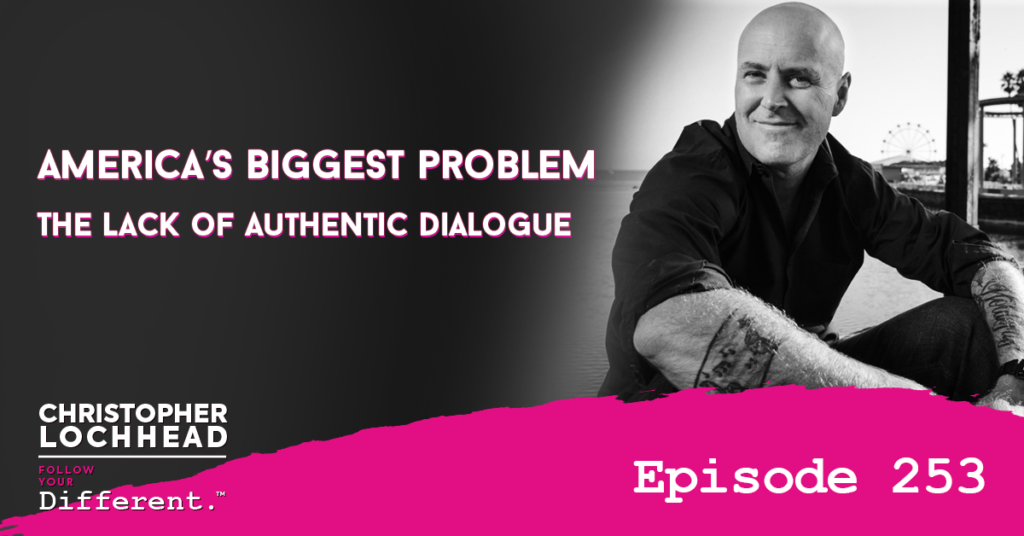
Podcast: Play in new window | Download (Duration: 6:42 — 4.6MB) | Embed
Subscribe: Apple Podcasts | Spotify | Pandora | RSS | More
In this special solo episode of Christopher Lochhead – Follow Your Different, I just want to share with you an element of conversation around the most recent Kyle Rittenhouse case. What I wanted to talk about is America’s biggest problem when it comes to situations like this. That is, the lack of any authentic dialogue about the matter.
Too Much Yelling, Not Enough Listening
Regardless on where you come out of the issue, there are some things that wasn’t properly address or we didn’t hear from at all. What I hoped we’d hear more was thoughtful, nuanced dialogue and conversation. Instead, what we got is what we’ve been getting a lot of in the United States of late, which is yelling and hardened positions. You’re only pro or anti-something. As part of that, whatever one side does, if you’re on that side, everything they do is right, and everything the other side does is wrong, and vice versa.
I think that’s really sad. Because thinking about thinking is the most important kind of thinking. And it’s only through dialogue, where human beings can achieve greater levels of understanding. There was no dialogue sparked by this horrible circumstance, horrible situation around what do we as Americans want to do about protests and riots? There wasn’t a discussion about that. Nor was there a discussion about self-defense, what do we mean by self-defense? Who decides where there’s a line where we can no longer defend ourselves or not?
“What I do know is we’re not having conversation. We’re not having dialogue. There’s a lot of yelling, and not a lot of listening.” – Christopher Lochhead
Bring Back the Willingness to Listen
If you’re a long-time listener of this podcast, you know that our mission has always been to celebrate real, authentic dialogue. In our case, dialogue around what it takes to design legendary business and legendary life. In hopes that we can bring back curiosity, we can bring back a willingness to listen, a willingness to co create our lives and ultimately, our culture and country together.
I got to tell you: sometimes, particularly of late, it feels like we’re losing that war. We might even have lost it completely, and we might never get it back. But I do know that a conversation about authentic dialogue, and why we don’t have it, and how we can have more is an important thing to do, even if very few people want to participate in that.
Bio
Christopher Lochhead is a #1 Apple podcaster and #1 Amazon bestselling co-author of books: Niche Down and Play Bigger.
He has been an advisor to over 50 venture-backed startups; a former three-time Silicon Valley public company CMO and an entrepreneur.
Furthermore, he has been called “one of the best minds in marketing” by The Marketing Journal, a “Human Exclamation Point” by Fast Company, a “quasar” by NBA legend Bill Walton and “off-putting to some” by The Economist.
In addition, he served as a chief marketing officer of software juggernaut Mercury Interactive. Hewlett-Packard acquired the company in 2006, for $4.5 billion.
He also co-founded the marketing consulting firm LOCHHEAD; the founding CMO of Internet consulting firm Scient, and served as head of marketing at the CRM software firm Vantive.
We hope you enjoyed this episode of Follow Your Different™! Christopher loves hearing from his listeners. Feel free to email him, connect on Facebook, Twitter, Instagram, and subscribe on iTunes!

